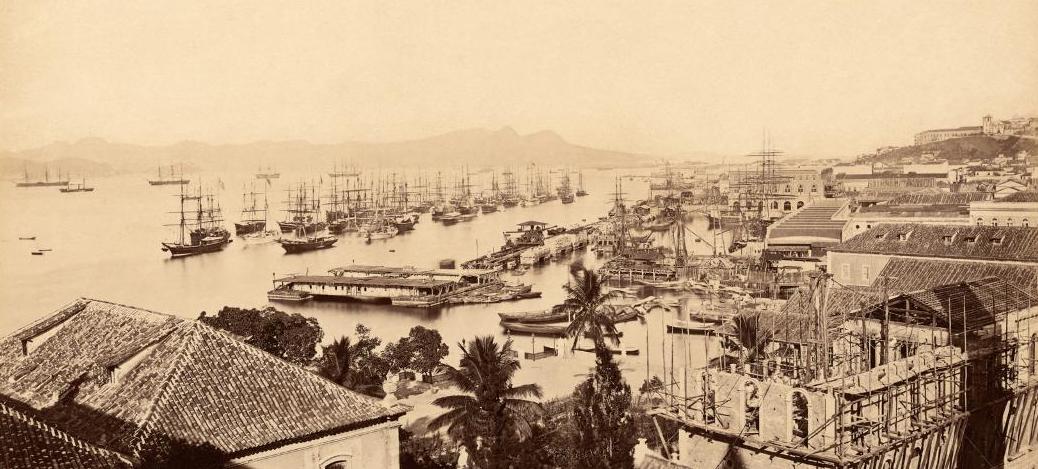An Ottoman Imam in Brazil
hosted by Sam Dolbee
| In 1866, a series of unexpected events led to an Ottoman imam by the name of Abd al-Rahman al-Baghdadi ending up in Rio de Janeiro. In this episode, Ali Kulez explains how he got there, and what happened when al-Baghdadi became close with enslaved and free Afro-Brazilian Muslims, and attempted to teach them his vision of Islamic orthodoxy. In addition to exploring themes of Islam and race in Brazil, Kulez also traces how the translation of al-Baghdadi's travel narrative can offer a window onto the history of South-South relations into the present. In closing, he discusses the challenge of evaluating past solidarities and differentiating them from those we might want to see.
 | Click for RSS Feed | 
|

|
In 1866, a series of unexpected events led to an Ottoman imam by the name of Abd al-Rahman al-Baghdadi ending up in Rio de Janeiro. In this episode, Ali Kulez explains how he got there, and what happened when al-Baghdadi became close with enslaved and free Afro-Brazilian Muslims, and attempted to teach them his vision of Islamic orthodoxy. In addition to exploring themes of Islam and race in Brazil, Kulez also traces how the translation of al-Baghdadi's travel narrative can offer a window onto the history of South-South relations into the present. In closing, he discusses the challenge of evaluating past solidarities and differentiating them from those we might want to see.
Contributor Bios
 |
Ali Kulez is an Assistant Professor of Hispanic Studies at Boston College, where he specializes in the literary and cultural history of modern Latin America. Dr. Kulez is currently working on two book projects: he is completing a manuscript on the intersections of food and identity in Cuban and Brazilian literature, and starting another on Brazil’s cultural encounters with Turkey and the Ottoman Empire. His work has appeared in, among other places, Luso-Brazilian Review, Revista de Estudios Hispánicos, CR: The New Centennial Review, and Middle Eastern Literatures. |
 |
Sam Dolbee is Assistant Professor of History at Vanderbilt University, where he teaches classes on environment, disease, and the modern Middle East. His book Locusts of Power is out now with Cambridge University Press. |
Credits
Episode No. 565
Release Date: 11 April 2024
Recording location: Beşiktaş, Istanbul
Recording location: Beşiktaş, Istanbul
Sound production by Sam Dolbee
Music: Zé Trigueiros, "Big Road of Burravoe," "Chiaroscuro"
Images, bibliography, and captions courtesy of Ali Kulez
Further Listening
 |
Eve Troutt Powell | 283
11/25/16
|
Narratives of Slavery in Late Ottoman Egypt |
 |
Cemil Aydın | 313
5/16/17
|
The Idea of the Muslim World |
 |
Stacy Fahrenthold | 404
3/1/19
|
WWI in the Syrian and Lebanese Diaspora |
 |
Lily Pearl Balloffet | 352
3/16/19
|
The Argentine Mahjar |
 |
Randa Tawil | 478
9/28/20
|
Zeinab's Odyssey: Gender, Mobility, and the Mahjar |
Images
 |
| A cartoon that creatively uses the Ottoman visit to satirize contemporary Brazilian politics. Semana Illustrada, July 8, 1866. |
 |
| A newspaper notice reporting that the Ottoman steamships will be repaired to honor the "coronation" anniversary of Sultan Abdulaziz, June 25, 1866. Diario de Rio de Janeiro, June 27, 1866. |
Select Bibliography
Akande, Habeeb. Illuminating the Blackness: Blacks and African Muslims in Brazil. London: Rabaah Publishers, 2016.
Brazil, Etienne Ignace. “La secte musulmane des Malès du Brésil et leur révolte en 1835.” Anthropos 4, no. 1 (1909): 99-105.
Costa e Silva, Alberto da. “Comprando e vendendo Alcorões no Rio de Janeiro do século XIX.” Estudos Avançados 18, no. 50 (2004): 285-294.
Diouf, Sylviane A. Servants of Allah: African Muslims Enslaved in the Americas. New York: New York University Press, 1998.
Graden, Dale Torston. From Slavery to Freedom in Brazil: Bahia, 1835-1900. Albuquerque: University of New Mexico Press, 2006.
Herzog, Christoph and Raoul Motika. “Orientalism "alla turca": Late 19th / Early 20th Century Ottoman Voyages into the Muslim 'Outback'.” Die Welt des Islams 40, no. 20 (2000): 139-95.
Korkmaz, Mehmet. “İstanbul’dan Basra’ya Gönderi̇len İlk Osmanlı Harp Gemi̇leri̇: Bursa ve İzmi̇r Korvetleri̇ni̇n Seyi̇r Günlüğü (24 Eylül 1865-3 Aralık 1866).” Tarih Dergisi 69, no. 1 (2019): 87-112.
Kulez, Ali. “An Early Encounter in the Global South: ‘Abd al-Rahman Al-Baghdadi’s Journey to the Brazilian Empire.” Luso-Brazilian Review 58, no. 2 (2021): 196-220.
Lovejoy, Paul E. “Background to rebellion: The origins of Muslim slaves in Bahia.” Slavery & Abolition 15, no. 2 (1994): 151-180.
Pinto, Paulo Gabriel Hilu da Rocha. Árabes no Rio de Janeiro: uma identidade plural. Rio de Janeiro: Cidade Viva Editora, 2010.
Quiring-Zoche, Rosemarie. “Das Reisbüche des ‘Abdarrahman al-Baghdadi.” Die Welt des Islams 40, no. 20 (2000): 196-334.
Reis, José João. O alufá Rufino: Tráfico, escravidão e liberdade no Atlântico negro (c.1822 - c.1853). Rio de Janeiro: Companhia das Letras, 2010.
---. “Os malês segundo ‘Abd Al-Raḥmān Al-Baghdādī, um imã otomano no Brasil oitocentista.” Revista Brasileira de História 43 (2023): 355-396.
---. Slave Rebellion in Brazil: The Muslim Uprising of 1835 in Bahia. Translated by Arthur Brakel. Baltimore: Johns Hopkins University Press, 1993.
Nina Rodrigues, Raymundo. Os africanos no Brasil. Rio de Janeiro: Centro Edelstein de Pesquisas Sociais, 2010.
Sochaczewski, Monique. Do Rio de Janeiro a Istambul: contrastes e conexões entre o Brasil e o Império Otomano (1850‐1919). Brasilia: Fundação Alexandre de Gusmão, 2017.












Comments
Post a Comment
Due to an overwhelming amount of spam, we no longer read comments submitted to the blog.